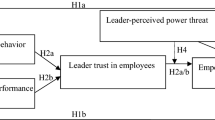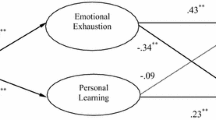Abstract
This study examined the relationship between ethical leadership as perceived by employees and the family satisfaction of the employees’ spouses. It also considered the mediating role of the employees’ ethical leadership in the family domain as perceived by their spouses, and the moderating role of the employees’ identification with leader. The results, which were based on a sample of 193 employee–spouse dyads in China, indicated that employees’ perceptions of ethical leadership in the workplace positively influenced their spouses’ family satisfaction. Moreover, employees’ ethical leadership in the family domain mediated this relationship. Furthermore, whereas identification with leader strengthened the relationship between the employees’ perceptions of ethical leadership in the workplace and their ethical leadership demonstrations in the family domain, it weakened the relationship between their ethical leadership demonstrations in the family domain and their spouses’ family satisfaction. The theoretical and managerial implications of these findings are discussed.



Similar content being viewed by others
References
Aiken, L. S., & West, S. G. (1991). Multiple regression: Testing and interpreting interactions. Thousand Oaks, CA: Sage Publications.
Albert, S., & Whetten, D. A. (1985). Organizational identity. In L. L. Cummings & B. M. Staw (Eds.), Research in organizational behavior (Vol. 7, pp. 263–295). Greenwich, CT: JAI Press.
Aryee, S., Fields, D., & Luk, V. (1999). A cross-cultural test of a model of the work–family interface. Journal of Management, 25, 491–511.
Ashforth, B. E., & Mael, F. (1989). Social identity theory and the organization. Academy of Management Review, 14, 20–39.
Au, K., & Kwan, H. K. (2009). Start-up capital and Chinese entrepreneurs: The role of family. Entrepreneurship Theory and Practice, 33, 889–908.
Bandura, A. (1986). Social foundations of thought and action: A social cognitive theory. Englewood Cliffs, NJ: Prentice Hall.
Brown, M. E., & Treviño, L. K. (2006). Ethical leadership: A review and future directions. Leadership Quarterly, 17, 595–616.
Brown, M. E., Treviño, L. K., & Harrison, D. A. (2005). Ethical leadership: A social learning perspective for construct development and testing. Organizational Behavior and Human Decision Processes, 97, 117–134.
Carlson, D. S., Ferguson, M., Kacmar, K. M., Grzywacz, J. G., & Whitten, D. (2011). Pay it forward: The positive crossover effects of supervisor work–family enrichment. Journal of Management, 37, 770–789.
Carlson, D. S., Grzywacz, J. G., & Zivnuska, S. (2009). Is work–family balance more than conflict and enrichment? Human Relations, 62, 1459–1486.
Edwards, J. R., & Lambert, L. S. (2007). Methods for integrating moderation and mediation: A general analytical framework using moderated path analysis. Psychological Methods, 12, 1–22.
Greenhaus, J. H., & Beutell, N. J. (1985). Sources of conflict between work and family roles. Academy of Management Review, 10, 76–88.
Greenhaus, J. H., & Powell, G. N. (2006). When work and family are allies: A theory of work–family enrichment. Academy of Management Review, 31, 72–92.
Grojean, M. W., Resick, C. J., Dickson, M. W., & Smith, D. B. (2004). Leaders, values, and organizational climate: Examining leadership strategies for establishing an organizational climate regarding ethics. Journal of Business Ethics, 55, 223–241.
Hammer, L. B., Cullen, J. C., Neal, M. B., Sinclair, R. R., & Shafiro, M. V. (2005). The longitudinal effects of work–family conflict and positive spillover on depressive symptoms among dual-earner couples. Journal of Occupational Health Psychology, 10, 138–154.
Hanson, G. C., Hammer, L. B., & Colton, C. L. (2006). Development and validation of a multidimensional scale of perceived work–family positive spillover. Journal of Occupational Health Psychology, 11, 249–265.
Kark, R., Shamir, B., & Chen, G. (2003). The two faces of transformational leadership: Empowerment and dependency. Journal of Applied Psychology, 88, 246–255.
Kopelman, R. E., Greenhaus, J. H., & Connolly, T. F. (1983). A model of work, family, and inter-role conflict: A construct validation study. Organizational Behavior and Human Performance, 32, 198–215.
Liu, J., Kwan, H. K., Fu, P. P., & Mao, Y. (2013a). Ethical leadership and job performance in China: The roles of workplace friendships and traditionality. Journal of Occupational and Organizational Psychology, 86, 564–584.
Liu, J., Kwan, H. K., Lee, C., & Hui, C. (2013b). Work-to-family spillover effects of workplace ostracism: The role of work–home segmentation preferences. Human Resource Management, 52, 75–94.
Loi, R., Lam, L. W., & Chan, K. W. (2012). Coping with job insecurity: The role of procedural justice, ethical leadership and power distance orientation. Journal of Business Ethics, 108, 361–372.
Lu, L., Cooper, C. L., Kao, S.-F., Chang, T.-T., Allen, T. D., Lapierre, L. M., et al. (2010). Cross-cultural differences on work-to-family conflict and role satisfaction: A Taiwanese–British comparison. Human Resource Management, 49, 67–85.
Mayer, D. M., Kuenzi, M., Greenbaum, R., Bardes, M., & Salvador, R. (2009). How low does ethical leadership flow? Test of a trickle-down model. Organizational Behavior and Human Decision Processes, 108, 1–13.
McNall, L. A., Nicklin, J. M., & Masuda, A. D. (2010). A meta-analytic review of the consequences associated with work–family enrichment. Journal of Business and Psychology, 25, 381–396.
Parasuraman, S., & Simmers, C. A. (2001). Type of employment, work–family conflict and well-being: A comparative study. Journal of Organizational Behavior, 22, 551–568.
Piccolo, R. F., Greenbaum, R., Den Hartog, D. N., & Folger, R. (2010). The relationship between ethical leadership and core job characteristics. Journal of Organizational Behavior, 31, 259–278.
Resick, C. J., Martin, G. S., Keating, M. A., Dickson, M. W., Kwan, H. K., & Peng, C. (2011). What ethical leadership means to me: Asian, American, and European perspectives. Journal of Business Ethics, 101, 435–457.
Schaubroeck, J. M., Hannah, S. T., Avolio, B. J., Kozlowski, S. W. J., Lord, R. G., Treviño, L. K., et al. (2012). Embedding ethical leadership within and across organization levels. Academy of Management Journal, 55, 1053–1078.
Sobel, M. E. (1982). Asymptotic confidence intervals for indirect effects in structural equation models. Sociological Methodology, 13, 290–312.
van Steenbergen, E. F., Ellemers, N., & Mooijaart, A. (2007). How work and family can facilitate each other: Distinct types of work–family facilitation and outcomes for women and men. Journal of Occupational Health Psychology, 12, 279–300.
Walumbwa, F. O., Mayer, D. M., Wang, P., Wang, H., Workman, K., & Christensen, A. L. (2011). Linking ethical leadership to employee performance: The roles of leader–member exchange, self-efficacy, and organizational identification. Organizational Behavior and Human Decision Processes, 115, 204–213.
Walumbwa, F. O., & Schaubroeck, J. (2009). Leader personality traits and employee voice behavior: Mediating roles of ethical leadership and work group psychological safety. Journal of Applied Psychology, 94, 1275–1286.
Wang, P., & Rode, J. C. (2010). Transformational leadership and follower creativity: The moderating effects of identification with leader and organizational climate. Human Relations, 63, 1105–1128.
Yukl, G. A. (2006). Leadership in organizations (6th ed.). Upper Saddle River, NJ: Pearson/Prentice Hall.
Zhang, H., Kwan, H. K., Everett, A. M., & Jian, Z. (2012). Servant leadership, organizational identification, and work-to-family enrichment: The moderating role of work climate for sharing family concerns. Human Resource Management, 51, 747–768.
Acknowledgments
This work was supported by the National Natural Science Foundation of China (Grant Numbers 71272007, 71302187, 71331004, and 71372005), the Program for Young Excellent Talents, UIBE (Grant Number 2013YQ04), the Beijing Higher Education Young Elite Teacher Project (Grant Number YETP0893), and Ministry of Education in China Project of Humanities and Social Sciences (Project Number 11YJC630098). The authors would like to thank Xu Huang for his helpful comments on early drafts of this paper.
Author information
Authors and Affiliations
Corresponding author
Appendix: The Measure of Ethical Leadership in the Family Domain
Appendix: The Measure of Ethical Leadership in the Family Domain
-
(1)
My spouse listens to what family members have to say.
-
(2)
My spouse criticizes family members who violate ethical standards.
-
(3)
My spouse conducts his/her personal life in an ethical manner.
-
(4)
My spouse has the best interests of family members in mind.
-
(5)
My spouse makes fair and balanced decisions.
-
(6)
My spouse can be trusted.
-
(7)
My spouse discusses ethics or values with family members.
-
(8)
My spouse sets an example of how to do things the right way in terms of ethics.
-
(9)
My spouse defines success not just by results but also the way that they are obtained.
-
(10)
When making decisions, my spouse asks “what is the right thing to do?”
Rights and permissions
About this article
Cite this article
Liao, Y., Liu, XY., Kwan, H.K. et al. Work–Family Effects of Ethical Leadership. J Bus Ethics 128, 535–545 (2015). https://doi.org/10.1007/s10551-014-2119-6
Received:
Accepted:
Published:
Issue Date:
DOI: https://doi.org/10.1007/s10551-014-2119-6




